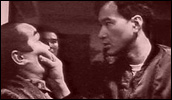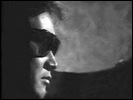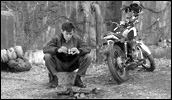A-Homansu
- Year
- 1986
- Original title
- A-Homansu
- Japanese title
- ア・ホーマンス
- Director
- Cast
- Running time
- 99 minutes
- Published
- 6 March 2005



by Tom Mes
The late Yusaku Matsuda's acting career consisted of two distinct periods. The first, during the latter half of the 1970s, was his action star phase, in which a permed, shade-wearing, gun-toting Matsuda redefined cool for the post-Bunta generation. The second, during the 1980s, saw him increasingly focus on meaty acting parts, falling back on his background in theater while working with the likes of Seijun Suzuki, Kiju Yoshida and Yoshimitsu Morita.
But despite Matsuda's best efforts, it's still the first phase in his career for which he is best remembered in Japan. Even though his last screen role, opposite Michael Douglas in Ridley Scott's Black Rain (1989), was a return to the action genre, Matsuda had long had his fill of tough guy roles by then. Nowhere is this more clearly put across than in his only film as a director, A-Homansu.
Co-written with Shoichi Maruyama, who penned two of Matsuda's early-80s transitional action films The Beast Must Die (1980) and Yokohama BJ Blues (1981), A-Homansu is ostensibly a cyberpunk/sci-fi action movie in the vein of The Terminator and the following year's Robocop. To Matsuda, however, it became an opportunity to finish off his former screen persona once and for all. With a title that forms an untranslatable combination of the words 'aho' (Kansai dialect for 'idiot') and 'performance' (itself a double reference, since it also points to the Donald Cammell/Nicholas Roeg film of that title, which it structurally resembles), this is a remorseless deflation of action hero cool.
Riding into Shinjuku on his motorbike and sleeping rough among the homeless of the seedy parts of town, silent, enigmatic Fu (or should that be understood as 'Who'?) quickly finds himself the target of the local chinpira. But when he pummels the hotheaded punks without breaking a sweat, he draws the attention of their leader Yamazaki (a young Ryo Ishibashi), who, with a rival gang breathing down his neck, sees Fu as a potentially valuable ally. The two men hit it off and Fu begins working for the young gangster, revealing himself not only a very efficient bare-fist fighter, but also seemingly invulnerable to injury.
Although the plot sounds like the set-up of any old genre quickie, in Matsuda's hands it becomes an assault on the action genre's very foundations. Much like Takeshi Kitano's Violent Cop three years later, it's quite astonishing to see the understanding first-time director Matsuda has of the cinematic form. A-Homansu is as much proof as you could ever wish for of the statement that film is a director's medium. Recount the plot, as above, and you get one type of movie, but watch the finished film and the result is something else entirely.
Firstly, Matsuda takes his lead character's formulaic coolness to extremes, exaggerating the cut-out hero in the Clint Eastwood/Steve McQueen mould to create a character who isn't simply tough but feels no pain, who isn't just brooding but almost catatonic, who isn't merely cool but shows not the slightest hint of emotion, who isn't simply a good fighter but shrugs off his opponents like flies, and who isn't just virile but a virtual babe magnet. Extrapolate the hero formula and what you come up with is something inhuman, a robot. Fu's huge, clunky sunglasses - an exaggeration of a pair of Ray-Bans - only emphasise his inhumanity, and force the character into constantly having to insist that he is indeed a human being, despite the scepticism of those around him. (His repeated "I'm human" is a riff on the equally unconvincing "I'm normal", as uttered by James Fox's warped gangster protagonist in Performance).
Matsuda doesn't simply end it there. Not content with ridiculing action hero cool, he goes one step further and makes it impossible for the audience to empathise with the lead character. This is where the film truly shows what he was capable of as a director. Calmly paced, with languid camera movement, the film's style constantly keeps the goings-on at arm's length. Matsuda uses a very cold, distantiated way of framing his shots, keeping his camera at a distance from the proceedings and letting scenes play out in a single take. He keeps actors' faces obscured, blocked by other objects or out of the frame entirely. The obvious use of sets and choice of locations (Shinjuku's high-rise buildings rarely looked as lifeless as they do here), plus the sparse use of music all combine to create a style that makes empathy on the part of the viewer impossible; we can't identify with the cool hero because the director won't allow us to.
The result may not be the kind of action film that falls into the hi-octane category, but it certainly is one of the more subversive entries into the genre. By displaying such mastery over his material and his means, Yusaku Matsuda shows that, in addition to being one of Japan's greatest screen stars, he also had the potential to grow into a great filmmaker. It's not only for the thought of what might have been that A-Homansu deserves to be regarded as one of the most intriguing Japanese films of the 1980s.